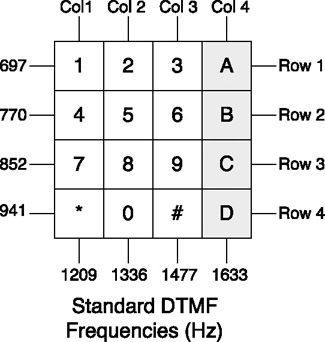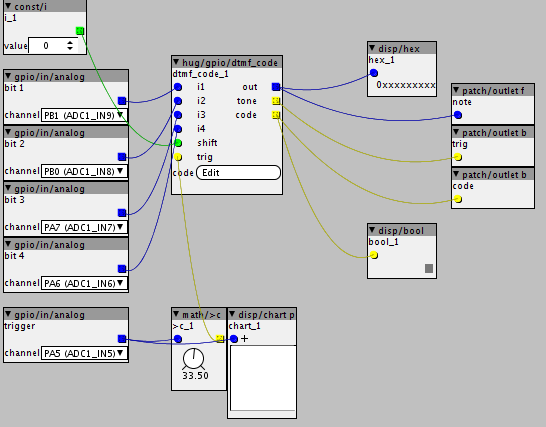How long to objects take to show up in the library? I can't see this one.
No matter, opened it from raw

How long to objects take to show up in the library? I can't see this one.
No matter, opened it from raw
How long to objects take to show up in the library? I can't see this one.
synchronize your local library?
anyhow you can instantly access them on github
Yep, figured it out. Need to go get some parts to finish the circuit. This is timely since I've found a big problem with my current method of using the MIDI socket header.
hug/gpio/dtmf_shift.axo
hug/gpio/dtmf_code.axo
hug/dtmf/dtmf_code.axs
the objects help to turn most landline telephones into MIDI controllers with 12-16 buttons. An MT8870 IC is needed to decode the dial signal to a four bit signal entering 4 gpio pins and an additional trigger while the dial button is pressed.
the telephone needs to work on DTMF (Dual Tone - Multi Frequency) signaling which most telephones nowadays do. One can clearly hear the familiar dial tone, which is actually two frequencies playing according to this matrix:

The circuit for the DTMF decoder chip MT 8870. The ports 11-15 need to be connected to gpio pins.
the objects work independently. the "code" object has an extra output which triggers when a certain combination of buttons was pressed.
This is the subpatch hug/dtmf/dtmf_core.axs which serves as an example:

hug/gpio/spi/shiftRegister.axo
i quickly copy/pasted this object upon this request.
the script author is @paul and background on the topic is given here.
Sorry but I can't see your repo in the 1.0.10 branch...
And it seems that your object is in /spi directory instead of /gpio/spi
He Hugo,
I'm interested in an extra midi input and I was wondering if if it matters wich gpio pin I take.
The only one free I have atm is PA6. Would that work?
Ok that sounds pretty clear, but doesn't match with what Hugo says in his example patch. Any Ideas @Hugo?
Yeah, that is the pin for receiveing Serial. Thanks for helping out. By the way, great weekend, people!
He Hugo I want to use your objects to connect two axoloti boards. The kind people at fablab told me that I could connect Pa2 to Pa3 directly and vice versa, and that both boards should have a common ground.
Have you tried this? @Johannes you think this is possible / without dangers?
P.s. Ah I see you suggest Pa2 to Pa3 on the same board in your help patch, so it should be no problem with two boards
He I succesfully send some midi notes back and forth. Now I have two things:
1. The scaling is a bit weird. Usualy with a note out object you would have a bipolar input with -64 to +64 transliating to 127 midi range.
Now for example if I enter 64 I get midi note 63 in axoloti (126 in midi). How would I get 64/127?
(2. How do I send CCs?
Edit: Ok I now understand a bit better what this is about. So you modded the script object so that you could use the mentioned pins to send midi. And depending on what kind of data you want to send you have to write your code into the script.
I was able to get your example patch script to send CCs. But for sending a value I would need the script with the 3 inlets that you have in the community library right? If you have a complete note out and CC (note number, trigger + value, CCnumber, trigger + value) ready I would really apreciate you posting it, since I'm lacking the programming skills to get this to work 